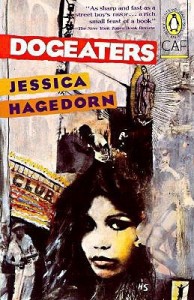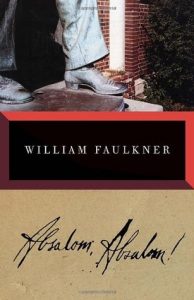 I’m thinking a lot about the feel of foreign words on the tongue and in print lately, so I want to talk about Jessica Hagedorn’s Dogeaters. She uses Tagalog and Spanish words throughout this novel set in the Phillipines. Most often these phrases are used in dialogue and consist of exclamations, family designations, or food. Hagedorn sets aside the words for the reader by using italics, but it is clear that the intermingling of these words would occur naturally in the characters’ speech. These words lend the story authenticity, but they can also interfere with the reader’s understanding of the story.
I’m thinking a lot about the feel of foreign words on the tongue and in print lately, so I want to talk about Jessica Hagedorn’s Dogeaters. She uses Tagalog and Spanish words throughout this novel set in the Phillipines. Most often these phrases are used in dialogue and consist of exclamations, family designations, or food. Hagedorn sets aside the words for the reader by using italics, but it is clear that the intermingling of these words would occur naturally in the characters’ speech. These words lend the story authenticity, but they can also interfere with the reader’s understanding of the story.
Spanish
The Spanish words Hagedorn uses are easily intelligible and familiar, I imagine, even to many readers who don’t speak Spanish. Words like “abuelita,” “hija,” and “prima” are all family designations and are used with varying regularity in novels set in America. Hagedorn uses the Spanish “abuelita” to differentiate between Rio’s two grandmothers. Both women are Filipina, but one has moved to Spain and considers herself more Spanish. Rio’s Filipina grandmother, Narcisa, is addressed as “Lola” while her grandmother with Spanish pretensions, Socorro, is addressed as “abuelita.”
Tagalog
Some of the Tagalog words Hagedorn uses are easily understandable based on the context clues around them: “[i]t is merienda time at the popular Cafe España.” It is clear that “merienda” has something to do with eating. As the novel progresses, Hagedorn uses the word over and over and the reader’s understanding of the word is enriched. Although I never fully understood the word, I came to understand “merienda” happens in the morning and may be akin to brunch. I was able to substitute “brunch” for “merienda” and at least understand what was going on in the scenes. A similar thing happened with “tsismis.” At first I had no idea what the characters were talking about, but by the time I read Rio’s father saying to her mother: “what do you do all day for exercise, except move your mouth up, down, and sideways, making tsismis with your queers,” I understood it meant gossip.
Defining Words in the Text
There were two instances where the non-English words were described by the characters themselves. In the first, Rio is describing her family and says: “Uncle Cristobal flies a Falangista flag above his front door to show his allegiance to Franco.” While I have no idea what the flag looks like, I completely understand its meaning and how it might pigeonhole Cristobal politically. The second instance is while Rio’s mother and father are discussing the difference between “putok” and “spiritik,” both of which mean fake. Rio’s father says: “Congressman Abad spiritiks when he plays golf, but General Ledesma rewards his army with cases of putok liquor.” I learn the nuance of the connotations of the two words, but Hagedorn also weaves in some of the flavor of local politics at the same time.
There are phrases that I never even quite got the gist of throughout the novel. Many of these seemed like interjections. One of these was “di ba” and another was “puwede ba.” They occurred frequently in conversation, often followed by an exclamation point, but with context clues. I interpreted them as exclamations, and I didn’t feel like I lost a major point of the sentence by not understanding them, but I never did get the full flavor of the sentence.
I am used to understanding even foreign words in novels, and it was a switch for me to not be able to understand exactly what was going on at all times. Hagedorn’s use of Tagalog made me more conscious of my use of Polish in my novel, Polska, 1994. Because Polish is, like Tagalog, not widely spoken outside of its native country (and expat communities), Hagedorn is teaching me to use context clues to help the non-Polish speaker understand the words. These foreign words and phrases need to be at least intelligible to an English-speaking reader, even if they convey a deeper meaning to a Polish-speaking reader.
If this review made you want to read the book, pick up a copy of Dogeaters from Bookshop.org. Your purchase keeps indie booksellers in business and I receive a commission.

